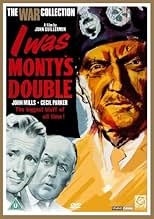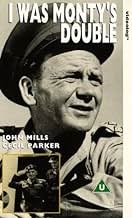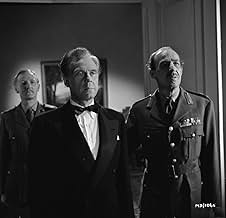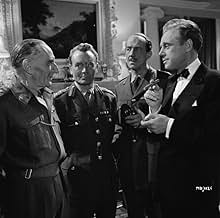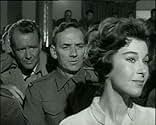AVALIAÇÃO DA IMDb
6,9/10
1,7 mil
SUA AVALIAÇÃO
Adicionar um enredo no seu idiomaDuring World War II, a British actor impersonates Field Marshal Montgomery in order to confuse German intelligence.During World War II, a British actor impersonates Field Marshal Montgomery in order to confuse German intelligence.During World War II, a British actor impersonates Field Marshal Montgomery in order to confuse German intelligence.
- Prêmios
- 1 indicação no total
M.E. Clifton James
- M.E. Clifton James
- (as M. E. Clifton James)
- …
Kenneth J. Warren
- F
- (as Kenneth Warren)
- …
- Direção
- Roteiristas
- Elenco e equipe completos
- Produção, bilheteria e muito mais no IMDbPro
Enredo
Você sabia?
- CuriosidadesThe screenplay omits David Niven's part in the real operation. It was he, working for the Army's film unit as a Lieutenant Colonel, who first made contact with M.E. Clifton James. His role is taken in this movie by Major Harvey (Sir John Mills).
- Erros de gravaçãoSoldiers refer to the Queen's Regulations, whereas at this time they should be the King's Regulations (King George VI).
- Citações
[last lines]
Civilian: [angrily after bumping into James outside a cinema] Why don't you watch where you're going! Who do you think you are?
Major Harvey: [to James after the two of them and Logan walk away from the man] Yes, who do you think you are? Monty?
[the three of them start to laugh as they continue walking along the crowded street]
- Cenas durante ou pós-créditosThe story you are about to see is the story of one of the boldest deceptions of our time in which Meyrick Clifton James, late of Her Majesty's Pay Corps, re-enacts his own real-life role. The Producer is deeply grateful to H. E. The Governor and Commander-in-Chief and those member of the Administration and Services at Gibraltar in March 1958, who rendered their invaluable assistance in the reconstruction of certain scenes of this film.
- ConexõesReferenced in Os Vingadores: Epic (1967)
Avaliação em destaque
At the fag-end of the 50's, a generation of long-demobbed soldiers were still trying to cut it in uniform, in a spate of cheap black-and-white war films. More convincing than most was the unknown star of this true story, a minor Australian actor who had been rejected by the entertainment services, and was reluctantly pen-pushing in the pay office, when someone noticed that he was a dead ringer for Montgomery.
This was in the run-up to D-Day, when the allies were desperate to draw enemy attention away from Normandy as the obvious invasion zone. Might a Monty-lookalike be able to fool German intelligence by touring North Africa, as though preparing for a big Mediterranean landing instead?
The actor in question, M.E. Clifton James, is secretly employed as a driver on Monty's staff, in order to get close enough to study his speech and mannerisms. But he doubts his own ability to replicate the character and personality of the great man, not least because 'Jimmy' is a chain-smoking alcoholic. Eventually, jolly optimist John Mills persuades him to go through with it, and suddenly he's stepping off a plane in Gibraltar, under scrutiny from enemy agents (one of them brilliantly sinister, as played by Marius Goring), as well as certain officers who remember Monty from before the war.
Defying many attempts on his life, Jimmy overcomes his desperate shyness, and learns to take massed salutes from whole armies. Then all too soon, D-Day has come and gone, his one brief star-performance is over, and it's back to the humble pay office. Except... they felt it necessary to bolt-on a false ending, about which we can reveal nothing, except that it never happened.
As for the real-life outcome, we have to face the disappointing fact that it was only part of a much larger decoy operation, which did throw the enemy into some confusion, but reports of Jimmy's own effort reaching Hitler's desk seem to be wishful thinking.
The film displays some recognisable weaknesses of those low-budget productions. The over-long opening section is taken up with John Mills' various flirtations, whose only consequence for the story is that his humourless boss (Cecil Parker) decides to replace their seductive secretary with the ugly-beautiful Barbara Hicks, in some ways more arresting. And the way Mills and Parker chat freely in public about top secret plans will grate on the ear of anyone who has worked in intelligence. No war-film of its day was complete without the stuffed-shirt spoilsport Allan Cuthbertson, who duly pops-up here, as does the perennial plug-ugly sergeant Anthony Sagar. Jimmy's one meeting with Monty is awkwardly dodged; we simply cut away from him on the steps of the general's caravan, although split-screen techniques had long since enabled an actor to shake hands with his own double (try the 1937 'Prisoner of Zenda').
None of this really detracts from the joy of the film, principally the deeply-believable performance of a professional actor, acting himself acting Monty. Sympathy and charm shine through this modest man, who seems to have been shabbily treated after the war, when he was reduced to the dole. Hopefully this popular film brought a little benison for the five short years that remained to him.
This was in the run-up to D-Day, when the allies were desperate to draw enemy attention away from Normandy as the obvious invasion zone. Might a Monty-lookalike be able to fool German intelligence by touring North Africa, as though preparing for a big Mediterranean landing instead?
The actor in question, M.E. Clifton James, is secretly employed as a driver on Monty's staff, in order to get close enough to study his speech and mannerisms. But he doubts his own ability to replicate the character and personality of the great man, not least because 'Jimmy' is a chain-smoking alcoholic. Eventually, jolly optimist John Mills persuades him to go through with it, and suddenly he's stepping off a plane in Gibraltar, under scrutiny from enemy agents (one of them brilliantly sinister, as played by Marius Goring), as well as certain officers who remember Monty from before the war.
Defying many attempts on his life, Jimmy overcomes his desperate shyness, and learns to take massed salutes from whole armies. Then all too soon, D-Day has come and gone, his one brief star-performance is over, and it's back to the humble pay office. Except... they felt it necessary to bolt-on a false ending, about which we can reveal nothing, except that it never happened.
As for the real-life outcome, we have to face the disappointing fact that it was only part of a much larger decoy operation, which did throw the enemy into some confusion, but reports of Jimmy's own effort reaching Hitler's desk seem to be wishful thinking.
The film displays some recognisable weaknesses of those low-budget productions. The over-long opening section is taken up with John Mills' various flirtations, whose only consequence for the story is that his humourless boss (Cecil Parker) decides to replace their seductive secretary with the ugly-beautiful Barbara Hicks, in some ways more arresting. And the way Mills and Parker chat freely in public about top secret plans will grate on the ear of anyone who has worked in intelligence. No war-film of its day was complete without the stuffed-shirt spoilsport Allan Cuthbertson, who duly pops-up here, as does the perennial plug-ugly sergeant Anthony Sagar. Jimmy's one meeting with Monty is awkwardly dodged; we simply cut away from him on the steps of the general's caravan, although split-screen techniques had long since enabled an actor to shake hands with his own double (try the 1937 'Prisoner of Zenda').
None of this really detracts from the joy of the film, principally the deeply-believable performance of a professional actor, acting himself acting Monty. Sympathy and charm shine through this modest man, who seems to have been shabbily treated after the war, when he was reduced to the dole. Hopefully this popular film brought a little benison for the five short years that remained to him.
- Goingbegging
- 4 de jan. de 2014
- Link permanente
Principais escolhas
Faça login para avaliar e ver a lista de recomendações personalizadas
- How long is Hell, Heaven or Hoboken?Fornecido pela Alexa
Detalhes
- Data de lançamento
- País de origem
- Idiomas
- Também conhecido como
- Hell, Heaven or Hoboken
- Locações de filme
- Empresas de produção
- Consulte mais créditos da empresa na IMDbPro
- Tempo de duração1 hora 41 minutos
- Cor
- Proporção
- 1.85 : 1
Contribua para esta página
Sugerir uma alteração ou adicionar conteúdo ausente

Principal brecha
By what name was O Homem que Enganou o Mundo (1958) officially released in India in English?
Responda
